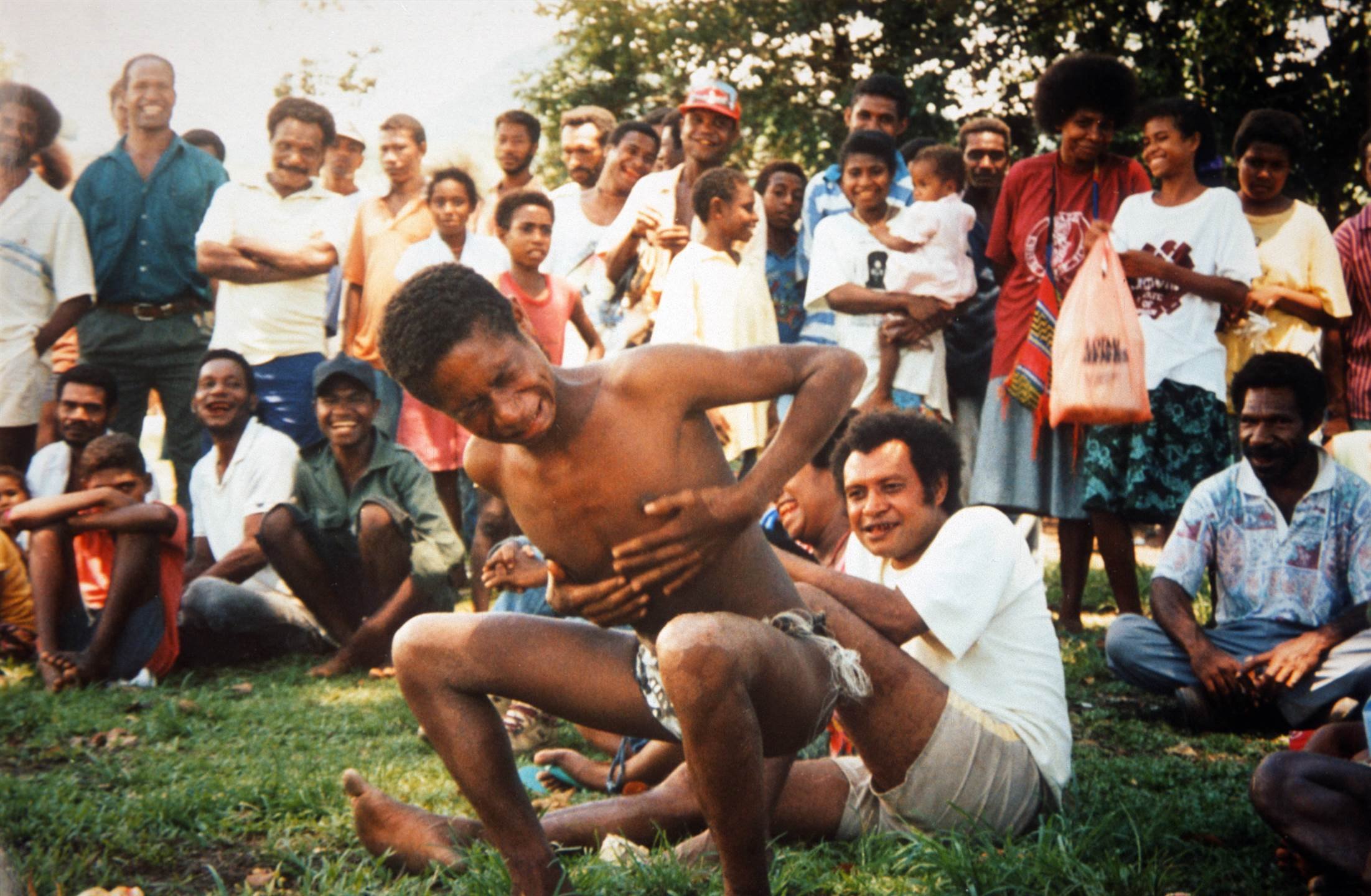History
The "wokabaut somil" in operation (circa. 1988)
Formally launched by Baron George Foulkes in 1999, Just World Partners represented a coming together of much of the earlier work that was initiated under the Foundation of the South Pacific (FSP) and a geographical branching out based on the success of some of its pioneering activities.
FSP, the precursor of JWP, was a “family” of Pacific NGOs supported by metropolitan NGOs in the US and Australia. UKFSP, set up by Canon Rex Davis (now Trustee of JWP) and originally chaired by Lord Bernard Braine MP, was officially part of the family but only really came of age when it started to generate funds for projects. The first funding emerged in 1987 and provided a sustainable alternative to rural communities in Papua New Guinea who were signing away their land rights to the so called “logging robber barons”. Almost always the end result was a devastated landscape with a pittance as the reward to the former landowners. The alternative, promoted by Canon Rex Davis of UKFSP, was the “wokabaut somil” - a transportable sawmill that could be used by the villagers themselves. The wokabaut somil had many benefits - it was designed for small-scale logging and the fact that it could be carried by two men meant that no logging roads were needed. Most importantly, it gave control back to local people who were able to keep their land and generate an income from the sale of their timber.
The formal launching of the Foundation of the South Pacific (1992)
The emphasis of empowering local people and creating opportunities for individuals and groups to lift themselves out of poverty was very much the driving principle of FSP and has remained the mission statement of JWP till today. It led to PEP - the Profitable Environmental Programme - a regional programme in which villagers were able to generate revenue from environmentally sustainable businesses. Other early environmental funding supported coral restoration in Fiji - including the setting up of a grey water management system for one of Fiji’s largest hotels to lessen the impact of waste on the surrounding reefs. UKFSP also encouraged the emergence of organic agriculture in Tonga (to address the number of Tongan farmers being poisoned because they could not read the English instructions on the pesticide drums).
Teaching Health through Theatre (1998)
Although a front runner on the environmental front, UKFSP also supported many health, livelihoods and educational projects over the years, directed by Dory Macintosh (current JWP Trustee) for 18 years. A range of vocational training centres in the Solomon Islands were funded to equip young people with skills that would increase their employment prospects. UKFSP was also involved in pioneering health activities - particularly the use of treated bed-nets to reduce the incidence of malaria in the Solomon Islands. That project had been listed as one of our big successes (since everyone assured us that they were using the nets) but the mystery of why malaria was not reducing was explained when we discovered that the nets were being used (very successfully) for fishing. You can’t win them all!
Monitoring the health and nutrition of the young
The Pacific Islands, because of their small population, proved to be a helpful setting for pilot projects and many innovative projects went on to be replicated at a wider scale. However, its small population, and the increasing political pressure to support the islands from Australia and New Zealand, meant that UKFSP had to broaden its scope if it was to continue providing funds to its FSP sister agencies. This led to the support of projects in Vietnam and the Philippines (in collaboration with the Australian FSP) and an expansion of the sustainable forestry programme into Central America. The latter was a high impact programme that resulted in certified sustainably harvested timber being exported to the UK and the development of a range of non timber products - including xate which was exported for flower arrangements. Finally the agency started to move into work in Africa where it supported livelihood programmes and also funded ground-breaking work to secure the release of child soldiers and rehabilitate them back into their villages.
The geographical expansion, together with a broadened scope, inevitably meant that the agency needed a new name. In his launching speech George Foulkes highlighted the appropriateness of the new name of "Just World Partners”. In particular he said that it captured the spirit of working in partnership with others to build capacity, to ensure that local people are in charge of their own development and, most importantly, there is a shared commitment to work together to create a better and fair world for all.





